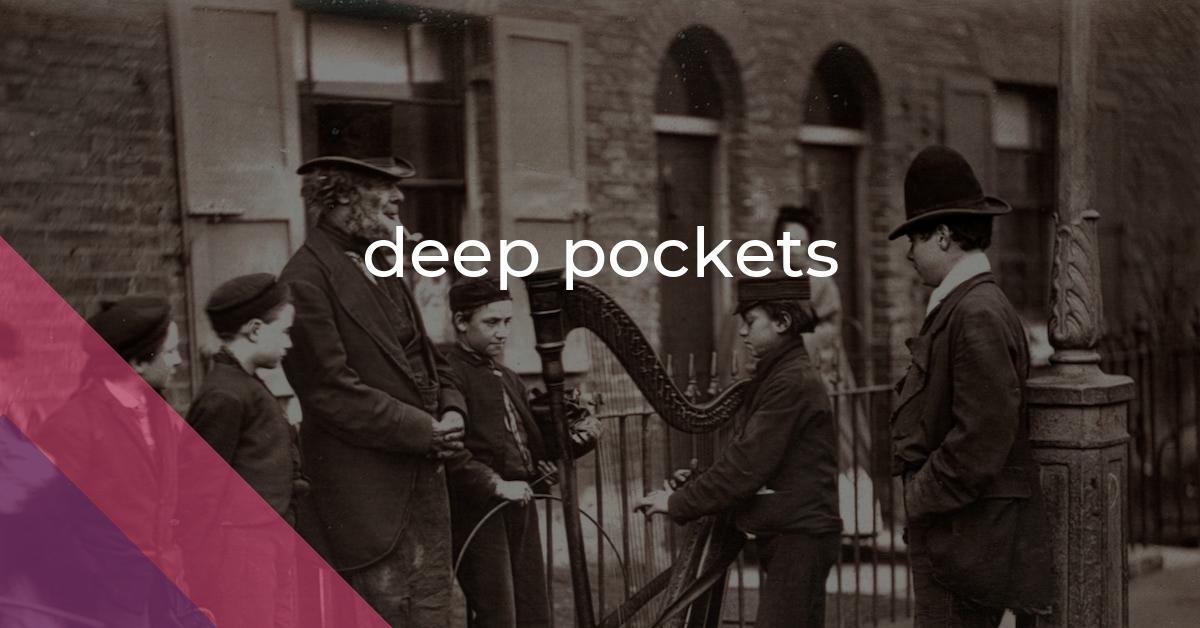deep pockets: Idiom Meaning and Origin
What does ‘deep pockets’ mean?
The idiom *deep pockets* refers to someone who has substantial financial resources or is able to spend a lot of money. It suggests that the person is wealthy and able to make significant financial commitments or contributions.

Idiom Explorer
The idiom *last of the big spenders* means to refer to someone who spends money extravagantly and is seen as one of the few remaining individuals who still does so.
The idiom "land poor" means to be wealthy in terms of owning land, but lacking the necessary funds or resources to maintain or develop it, resulting in financial difficulty.
The idiom "in the money" means to be in a financially successful or prosperous situation.
The idiom "in the hole" means to be in debt or in a difficult financial situation. It is often used to describe a person or a company that owes money and is struggling to repay it.
The idiom "in someone's pocket" means to be under someone's control or influence.
The idiom "in one's pocket" means having control or influence over someone or something.
Meaning: Someone who spends a large portion of their income on housing expenses, leaving little money for other expenses or savings.
The idiom "hold the purse strings" means having control or authority over financial matters or spending decisions.
The idiom "have more money than God" means to be extremely rich or wealthy beyond imagination.
Revealing Secrets
The idiom "deep pockets" is commonly used in American English to describe someone who has a lot of money or financial resources. In a literal sense, it refers to having pockets that are unusually deep, allowing for the storage of a large amount of money. However, when used metaphorically, it conveys a sense of wealth and financial power.
This idiom is often used when referring to individuals or organizations who have significant financial means and are able to invest or spend money freely. It implies that these individuals or organizations are capable of providing substantial financial support or assistance, whether it be in the form of donations, investments, or funding for various projects.
The origin of the idiom "deep pockets" can be traced back to the late 19th century. It is believed to have originated in the United States, where it was first used in the business and legal contexts. In legal terms, the idiom became associated with companies who had substantial financial resources and could afford to pay large sums of money in legal settlements or judgments.
Over time, the idiom "deep pockets" has become more commonly used in everyday language, extending beyond its original business and legal contexts. It is often used in informal conversations, news articles, and literature to describe individuals or entities with significant financial assets. The imagery invoked by the idiom, with its association to having deep pockets capable of holding vast amounts of money, effectively conveys the idea of wealth and financial power.
When someone is said to have "deep pockets," it means they have a lot of money - what some may call "big bucks." These individuals or organizations have the financial resources to invest or spend money freely, as if it were no big deal. They can afford to be generous, whether it's by making large donations, investing in businesses, or funding projects. In short, they are big spenders with the means to back it up.
Another related idiom is being "cashed up." Imagine someone with deep pockets; they would naturally have a lot of cash on hand. Being "cashed up" means having a lot of money readily available, ready to be spent or used. Those with deep pockets are often "cashed up" and can easily access their funds whenever they need to make a purchase or support a cause.
Additionally, those with deep pockets often "hold the purse strings." In other words, they have control over the money and decide how it is spent. This idiom implies that individuals or organizations with deep pockets have financial power and influence. They can dictate where the money goes and make decisions that have a significant impact on projects, businesses, or even entire industries.
Lastly, being "in the money" is a phrase that describes someone who is wealthy or financially successful. When someone has deep pockets, it's safe to say they are "in the money." They have a significant amount of wealth and financial resources that allow them to lead a comfortable and luxurious lifestyle. They are not only financially secure but also have the means to take advantage of various opportunities that come their way.
While the idiom "deep pockets" predominantly carries positive connotations of wealth and ample resources, it can also be used sarcastically or in a negative context. For example, it may be used to criticize individuals or organizations who hoard their wealth and do not use it for the benefit of others. In these cases, it highlights the perceived unfairness of the unequal distribution of wealth in society.
Overall, the idiom "deep pockets" is a concise and evocative way to depict someone or something with considerable financial means. Its origins in the business and legal world have expanded to encompass a broader understanding of wealth and resources. Whether used literally or metaphorically, the idiom effectively communicates the concept of financial abundance and influence.
Example usage
Examples:
- He always pays for expensive dinners and vacations, he must have deep pockets.
- The company's CEO has deep pockets, allowing them to invest in new technology.
- With his deep pockets, the philanthropist donated a significant amount to the charity.
Explanation:
The idiom "deep pockets" is used to describe someone who has a lot of money or financial resources. It indicates that a person has the ability to spend or donate large amounts of money without facing financial difficulties. The term "pockets" is used metaphorically to refer to a person's wealth or financial capability.
More "Finance" idioms



